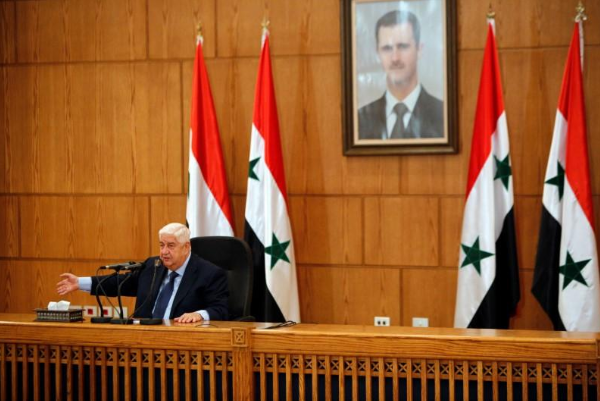Many let out a sigh of relief when President Mohamed Morsy sent some of the country’s leading military generals into retirement in August 2012, believing that this could be the end of an 18-month struggle to halt military trials of civilizans.
But that relief seems to have been premature.
At least 12,000 civilians were subject to military trials during the military council's reign following the ouster of former President Hosni Mubarak. That number has continued to rise since the Muslim Brotherhood-affiliated president was sworn in this past June.
And now, certain articles in the recently ratified Constitution have been criticized for legalizing the military trials of civilians — a major setback for activists, some say.
The divisive Constitution passed in a snap referendum late December includes Article 198, which says civilians can be tried before military courts if their alleged crime “harms the Armed Forces.” The definition of “harm” is left up to the law.
New cases amid less support
Activists say that regular citizens are starting to be brought before military trials. While under the Supreme Council of the Armed Forces most of the known cases of military trials were against political activists, under Morsy’s rule cases are predominantly brought against citizens with no political affiliation who have run into trouble with the army institution or its personnel.
Most recently, the case of 25 civilians facing military trials in relation to the Qursaya Island eviction has been in the spotlight.
Since 2007, Qursaya residents have been fighting allegations that the land they live on belongs to the army, despite a February 2010 court order granting civilians the right to live and work on the island. On 18 November, military forces stormed the resources-rich Nile island at dawn, killing one and detaining 25 others as they attempted to forcibly evict residents.
The detainees have been accused of attacking the military and its property, and are now facing military trials. They are awaiting a final ruling to be issued at the end of January.
Sherif al-Hosary, a 33-year-old father of two, is facing a military trial on charges of possessing army secrets, according to a report filed against him by a retired military general. But activists say Hosary, who owns a computer repairs shop, was arrested after a financial dispute with the general. He has been released pending investigation.
Sheikh Mohamed Nada, an elderly, blind preacher at a mosque in Ismailiya Governorate, has a story similar to that of the Qursaya residents. The sheikh had built a house on land he owns, but has since been the victim of crackdowns by members of the adjacent military unit, who claim that the land belongs to them.
While official documents in Sheikh Nada’s possession prove otherwise, he and his family have been subject to eviction attempts by military forces. When he filed a lawsuit demanding compensation, his son was arrested and is now facing a military trial, with the next court session set for 21 January.
Members of the No to Military Trials campaign say the level of support for cases implicating ordinary citizens is disappointing.
“One of the most crucial problems we face is that all of these cases occurred during the debate surrounding the Constitution, so most political figures were busier with the ‘yes’ and ‘no’ campaigns [ahead of the referendum],” Maha Maamoun, a member of the group, tells Egypt Independent.
The story of independent journalist Mohamed Sabry, arrested in Sinai while allegedly filming a military unit, illustrates what can happen when enough attention is given to a case.
Investigators claim that Sabry took photos of border troops’ vehicles and guard towers at the Karam Abu Salem crossing, while Sabry said he was reporting on a story about the defense minister’s decision to ban land ownership along the Israeli border. He is now facing a military trial, but due to the sizeable support and attention he received, the military court decided to release him pending investigation. Sabry’s next hearing is scheduled for 21 January.
“We are doing our best to make the cause grow. On Sunday, hundreds of well-known activists, like Alaa Abdel Fattah and Takadum al-Khatib, joined us in a protest in Ismailiya to support Sabry and Sheikh Nada,” Maamoun said.
Constitutional dilemma
As Article 198 of the new Constitution states, “The military judiciary is an independent judicial institution, the only body specialized in the jurisdiction over all crime committed by military officers and soldiers.”
Civilians cannot stand before military courts “except in crimes that harm the Armed Forces,” the article continues. Coupled together, the two articles give the Military Judiciary Law the power to define these crimes and jurisdictions.
In addition, the same article says that judges in the military judiciary are independent and cannot be sacked, and shall have the same privileges, rights and duties of civilian judges.
Privileges and safeguards granted the military institution — when it comes to military trials, the lack of oversight of the military’s budget and the powers of the Military Defense Council — are exceptional under the new Constitution, critics say.
The new powers undermine the power of elected civilian institutions, a dynamic thought to have shifted when Morsy forced the top military generals into retirement.
The 1971 Constitution granted citizens the right to resort to their own civilian judges in Article 68, while Article 183 stipulated that the law should organize the powers of the military judiciary, and did not grant the institution any constitutional privileges.
Even as late President Gamal Abdel Nasser cemented military rule, the 1954 Constitution referred to the military judiciary as “military councils” entitled only to investigate violations by military members.
“Our struggle now is doubled,” says Ahmed Ragheb, rights lawyer and head of the Hisham Mubarak Law Center.
“We are struggling to modify these constitutional articles related to military tribunals as well as our normal struggle to free those who have been detained,” he says.
There are two problems with the constitutional role given to the military judiciary. The first, Ragheb argues, is equating military judges with their civilian counterparts, which further legitimizes the role of an institution that does not commit to the very basic standards of fair trials. “The military judiciary is highly politicized and not independent,” he adds.
The second problem is the legitimization of military trials by including the exception of crimes related to the Armed Forces. “All of the cases facing military trials since the revolution fall under this broad exception,” he says.
Activists have slammed the Islamist forces that dominated the Constituent Assembly tasked with drafting the Constitution, suggesting that the articles related to the military were a product of a deal brokered between the Muslim Brotherhood and the military council.
“We rejected the Constitution primarily for imposing a military guardianship,” says Ahmed Imam, member of the Strong Egypt Party’s political communication committee.
To Imam, it is clear that a deal was worked out, namely after seeing the reaction of Islamist members regarding his party’s calls to amend these articles during sessions of the national dialogue.
“We were told that this is the farthest they can reach with the military, and that the military institution cannot be humiliated,” he says, describing an utter lack of political will or any genuine intention to give these articles a second glance.
“We all feel that these dialogues are cosmetic and not serious,” Imam says.



